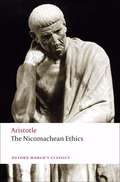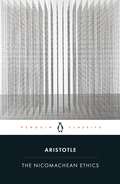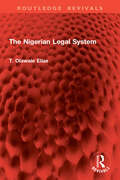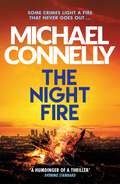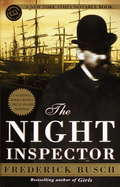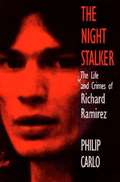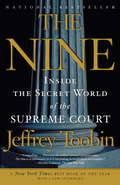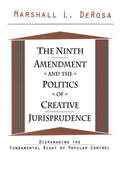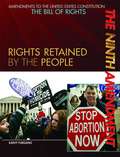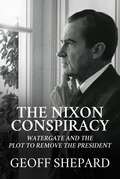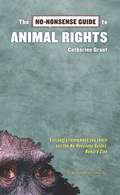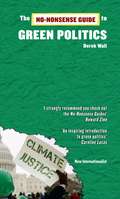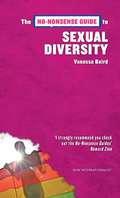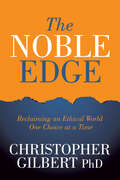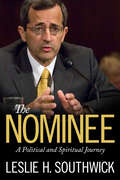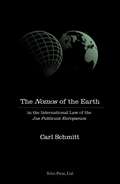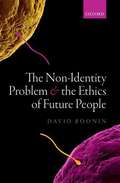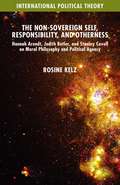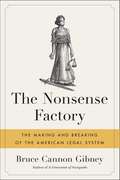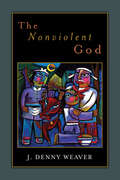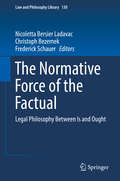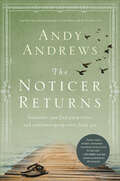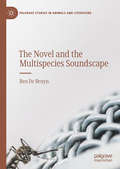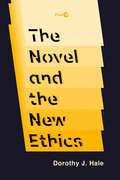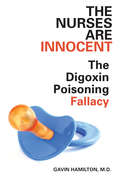- Table View
- List View
The Nicomachean Ethics
by AristotleThe Author examines the nature of happiness, which he defines as a specially good kind of life. He considers the nature of practical reasoning, friendship, and the role and importance of the moral virtues in the best life.
The Nicomachean Ethics
by AristotleOne of the most important philosophical works of all time, in a new Penguin Classics translation by Adam Beresford'Right and wrong is a human thing' What does it mean to be a good person? Aristotle's famous series of lectures on ethical topics ranges over fundamental questions about good and bad character; pleasure and self-control; moral wisdom and the foundations of right and wrong; friendship and love in all their forms - all set against a rich and humane conception of what makes for a flourishing life. Adam Beresford's freshly researched translation presents many of Aristotle's key terms and idioms in standard English for the first time, and faithfully preserves the unvarnished style of the original.
The Nigerian Legal System (Routledge Revivals)
by T. Olawale EliasOriginally published in 1954 and here reissuing the second edition of 1963, The Nigerian Legal System (now with a new preface by Olusoji Elias), is an account of the history of the courts, the sources and general principles of law in Nigeria. It discusses the applications of the English doctrine of judicial precedent, the relationship of English law to customary law, and the limits within which English and Nigerian conceptions of contract, tort, crime, land tenure and personal relations operate. The author also deals with the local administration of the law, the intercourse between the bench and the bar and, not least, the future of Nigerian law.This valuable book is of use to students of African studies and lawyers who in their work have dealings with the countries of Africa. It first appeared under the title Groundwork of Nigerian Law, but the present title is a more apt description of the content. A number of textual errors have been corrected, and large sections have been entirely re-written or expanded in order to bring the book up to date.
The Night Fire: A Ballard and Bosch Thriller (Ballard and Bosch)
by Michael ConnellyLAPD Detective Renée Ballard and Harry Bosch come together again on the murder case that obsessed Bosch's mentor - but was this flame kept alive, or a secret that was meant to be snuffed out?Back when Harry Bosch was just a rookie homicide detective, he had an inspiring mentor who taught him to take the work personally and light the fire of relentlessness for every case. Now that mentor, J.J. Thompson, is dead, but after his funeral his widow hands Bosch a murder book that Thompson took with him when he left the LAPD 20 years before - the unsolved killing of a troubled young man in an alley used for drug deals.Bosch brings the murder book to Renée Ballard and asks her to help him find what about the case lit Thompson's fire all those years ago. That will be their starting point.The bond between Bosch and Ballard tightens as they become a formidable investigation team. And they soon arrive at a worrying question: Did Thompson steal the murder book to work the case in retirement, or to make sure it never got solved?
The Night Inspector
by Frederick BuschAn immensely powerful story, The Night Inspector follows the extraordinary life of William Bartholomew, a maimed veteran of the Civil War, as he returns from the battlefields to New York City, bent on reversing his fortunes. It is there he meets Jessie, a Creole prostitute who engages him in a venture that has its origins in the complexities and despair of the conflict he has left behind. He also befriends a deputy inspector of customs named Herman Melville who, largely forgotten as a writer, is condemned to live in the wake of his vanished literary success and in the turmoil of his fractured family.Delving into the depths of this country's heart and soul, Frederick Busch's stunning novel is a gripping portrait of a nation trying to heal from the ravages of war--and of one man's attempt to recapture a taste for life through the surging currents of his own emotions, ambitions, and shattered conscience.
The Night Stalker: The True Story of America's Most Feared Serial Killer
by Philip CarloBased on hours of interviews with Ramirez on California's Death Row, a chilling account of the crimes of the "Night Stalker" follows Ramirez's criminal odyssey, from his first brush with the law, to his Los Angeles murder spree, to the investigation that brought him to justice.
The Nine: Inside the Secret World of the Supreme Court
by Jeffrey ToobinInThe Nine, acclaimed journalist Jeffrey Toobin takes us into the chambers of the most important—and secret—legal body in our country, the Supreme Court, revealing the complex dynamic among the nine people who decide the law of the land. An institution at a moment of transition, the Court now stands at a crucial point, with major changes in store on such issues as abortion, civil rights, and church-state relations. Based on exclusive interviews with the justices and with a keen sense of the Court’s history and the trajectory of its future, Jeffrey Toobin creates inThe Ninea riveting story of one of the most important forces in American life today.
The Ninth Amendment and the Politics of Creative Jurisprudence: Disparaging the Fundamental Right of Popular Control
by Marshall DeRosaThe Ninth Amendment holds that every right not explicitly granted to the federal government by the Constitution belongs to the states or to the individual. Further, those rights held by the government should not be construed to deny or disparage other rights held by the people. As in other areas of contention between federal power and states' rights, the Ninth Amendment has become subject to activist Supreme Court interpretation whereby the traditional model of federalism, in which states had meaningful public policy prerogatives, has given way to a model in which states become mere extensions of the U. S. government.In this volume, Marshall DeRosa provides a thorough analysis of Supreme Court unenumerated rights policy and offers suggestions toward reestablishing American federalism as envisioned by the framers of the Constitution. The book opens with a review and analysis of current debates over Ninth Amendment rights and then utilizes the privileges and immunities clauses as demonstrative of the traditional relationship between the states' police powers and unenumerated fundamental rights. DeRosa then considers the critical role of academia in shifting public policy away from popular control and toward the judiciary. Later chapters include national and state case studies as instances of judicial creativity, an examination of the effects of Ninth Amendment jurisprudence on the Second Amendment as it bears on the gun control debate, and a comparative analysis of contrasting theories on the status of unenumerated rights. In his conclusion DeRosa offers some prescriptive thoughts on how to restore the original constitutional concept of popular consent as a remedy to an increasingly unaccountable federal judiciary.By restoring the Ninth Amendment to the context of American federalism, this volume constitutes a major contribution to contemporary scholarship, challenging a corpus of commentary that either ignores, misunderstands, or misrepresents the relevance of popular control in the articulation of unenumerated rights. The Ninth Amendment and the Politics of Creative Jurisprudence will be of interest to political scientists, historians, legal theorists, and political practitioners.
The Ninth Amendment: Rights Retained By The People (Amendments To The United States Constitution: The Bill Of Rights)
by Kathy FurgangOne of the more elusive and nebulous of Constitutional amendments, the Ninth Amendment essentially guarantees unnamed and unspecified individual rights not explicitly enumerated within the Constitution or the other amendments. From its ratification, the amendment has caused confusion and uncertainty. Even Supreme Court justices have been unsure how to interpret it and unclear about exactly what individual rights it extends to American citizens. The vagueness of the amendments wording has discouraged many people from basing their claim to a specific right on the Ninth Amendment. This book penetrates the veil of mystification that surrounds the amendment and explains exactly why it was proposed and ratified, and why it was worded in the way it was. It shows how consensus about how to interpret and apply the amendment has very gradually emerged through the course of several landmark Supreme Court Cases. Indeed, the story of the Supreme Court's grappling with the Ninth Amendment provides a window onto some of the most seminal and iconic moments in American history, including New Deal politics, labor activities, fair housing laws, and past and current hot-button issues of privacy.
The Nixon Conspiracy: Watergate and the Plot to Remove the President
by Geoff ShepardGeoff Shepard&’s shocking exposé of corrupt collusion between prosecutors, judges, and congressional staff to void Nixon&’s 1972 landslide reelection. Their success changed the course of American history.Geoff Shepard had a ringside seat to the unfolding Watergate debacle. As the youngest lawyer on Richard Nixon&’s staff, he personally transcribed the Oval Office tape in which Nixon appeared to authorize getting the CIA to interfere with the ongoing FBI investigation, and even coined the phrase &“the smoking gun.&” Like many others, the idealistic Shepard was deeply disappointed in the president. But as time went on, the meticulous lawyer was nagged by the persistent sense that something wasn&’t right with the case against Nixon. The Nixon Conspiracy is a detailed and definitive account of the Watergate prosecutors&’ internal documents uncovered after years of painstaking research in previously sealed archives. Shepard reveals the untold story of how a flawed but honorable president was needlessly brought down by a corrupt, deep state, big media alliance—a circumstance that looks all too familiar today. In this hard-hitting exposé, Shepard reveals the real smoking gun: the prosecutors&’ secret, but erroneous, &“Road Map&” which caused grand jurors to name Nixon a co-conspirator in the Watergate cover-up and the House Judiciary Committee to adopt its primary Article of Impeachment. Shepard&’s startling conclusion is that Nixon didn&’t actually have to resign. The proof of his good faith is right there on the tapes. Instead, he should have taken his case to a Senate impeachment trial—where, if everything we know now had come out—he would easily have won.
The No-Nonsense Guide to Animal Rights
by Catharine GrantToday animals need protecting more than ever: those bred for laboratories, zoos, and hunting, and also those reared intensively on farms. And out in the wild, animals are losing their habitats to environmental exploitation.<P><P>Dispelling the myth that the protection of animals' rights is a modern, Western concern, this No-Nonsense Guide to Animal Rights explains the key issues, charts the growth of the animal rights movement, and looks at the welfare and protection laws. And it includes a practical day-to-day guide to what individuals can do to minimize exploitation.
The No-Nonsense Guide to Green Politics
by Derek WallClimate chaos and pollution, deforestation and consumerism: the crisis facing human civilization is clear enough. But the response of politicians to it has been cowardly and inadequate, while environmental activists have tended to favor single-issue campaigns rather than electoral politics.The No-Nonsense Guide to Green Politics measures the rising tide of eco-activism and awareness and explains why it heralds a new political era worldwide.Derek Wall is a former principal speaker of the British Green Party. He is the author of numerous books, including Babylon and Beyond: The Economics of Anti-Capitalist, Anti-Globalist and Radical Green Movements.
The No-Nonsense Guide to Sexual Diversity
by Vanessa BairdThe treatment of sexual minorities--whether lesbian, gay, bisexual, or transgender--varies significantly in different parts of the world. In some countries, equal rights have been achieved and progress is being made against discrimination; in others, being gay still incurs the death penalty.This guide examines all the colors of the sexual rainbow, unearths hidden histories, and looks at contributions from medicine and science. It also includes a unique global survey of laws that affect sexual minorities. Vanessa Baird has been co-editor at New Internationalist magazine since 1986. Her previous books include, as compiler and editor, Eye to Eye Women.
The Noble Edge: Reclaiming an Ethical World One Choice at a Time
by Christopher GilbertThe award-winning guide to developing ethics, trust, and authenticity in business and life—and achieving results that matter. Being trusted is the foundation of our greatest personal freedoms. In a time of deepening divisions and &“alternative facts,&” trust and authenticity grow more precious by the hour. The Noble Edge: Reclaiming an Ethical World One Choice at a Time provides an inspirational conversation spiced with personal stories, humorous anecdotes, and invaluable guidance about making consistently good choices. Based on three research-proven steps and nine principles for leading an ethically driven life, The Noble Edge brings a fresh approach to personal growth and inspires real change to empower a brighter future. As useful in the boardroom as the family room, this easy-to-follow book contains a powerful model that sharpens the ethical lens and empowers readers to examine their own standards and values and resist pressures to ignore what is right in favor of what passes for &“success.&” For those who want truth in their decisions, authenticity in their relationships, and solid ground for making tough choices in business and in life, this is an encouraging guide to achieving moral progress individually and collectively, and bringing better ethics into organizations, families, communities, and the world. Winner of the Paris Book Festival Award, NABE Pinnacle Book Achievement Award, International Impact Book Award, Literary Titan Book Award, Firebird Book Awards in three categories, NYC Big Book Award, Canadian Book Club Award and Hollywood Book Festival Runner-up &“Offers the wisdom of the ages in a style that is deep yet easy to understand.&” —Trip Barthel, author of Transforming Conflict into Consensus
The Nominee: A Political and Spiritual Journey (Willie Morris Books in Memoir and Biography)
by Leslie H. SouthwickPresident George W. Bush nominated Leslie H. Southwick in 2007 to the federal appeals court, Fifth Circuit, based in New Orleans. Initially, Southwick seemed a consensus nominee. Just days before his hearing, though, a progressive advocacy group distributed the results of research it had conducted on opinions of the state court on which he had served for twelve years. Two opinions Southwick had signed off on but not written became the center of the debate over the next five months. One dealt with a racial slur by a state worker, the other with a child custody battle between a father and a bisexual mother. Apparent bipartisan agreement for a quick confirmation turned into a long set of battles in the Judiciary Committee, on the floor of the Senate, and in the media.In early August, Senator Dianne Feinstein completely surprised her committee colleagues by supporting Southwick. Hers was the one Democratic vote needed to move the nomination to the full Senate. Then in late October, by a two-vote margin, he received the votes needed to end a filibuster. Confirmation followed.Southwick recounts the four years he spent at the Department of Justice, the twelve years on a state court, and his military service in Iraq while deployed with a Mississippi National Guard Brigade. During the nomination inferno Southwick maintained a diary of the many events, the conversations and emails, the joys and despairs, and quite often, the prayers and sense of peace his faith gave him--his memoir bears significant spiritual content. Throughout the struggle, Southwick learned that perspective and growth are important to all of us when making decisions, and he grew to accept his critics, regardless of outcome. In The Nominee there is no rancor, and instead the book expresses the understanding that the difficult road to success was the most helpful one for him, both as a man and as a judge.
The Nomos of the Earth: in the International Law of the Jus Publicum Europaeum
by Carl SchmittThe Nomos of the Earth is Schmitt's most historical and geopolitical book. It describes the origin of the Eurocentric global order, which Schmitt dates from the discovery of the New World, discusses its specific character and its contribution to civilization, analyzes the reasons for its decline at the end of the 19th century, and concludes with prospects for a new world order. It is a reasoned, yet passionate argument in defense of the European achievement - not only in creating the first truly global order of international law, but also in limiting war to conflicts among sovereign states, which, in effect, civilized war. In Schmitt's view, the European sovereign state was the greatest achievement of Occidental rationalism; in becoming the principal agency of secularization, the European state created the modern age. Since the problematic of a new nomos of the earth has become still more critical with the onset of the post-modern age and post-modern war, Schmitt's text is even more timely and challenging. <p><p> Remarkable in Schmitt's discussion of the European epoch of world history is the role played by the New World, which ultimately replaced the Old World as the center of the earth and became the arbiter in European and world politics. According to Schmitt, the United States' internal conflicts between economic presence and political absence, between isolationism and interventionism, are global problems, which today continue to hamper the creation of a new world order. But however critical Schmitt is of American actions at the turn of the 20th century and after World War I, he considered the United States to be the only political entity capable of resolving the crisis of global order.
The Non-Identity Problem and the Ethics of Future People
by David BooninDavid Boonin presents a new account of the non-identity problem: a puzzle about our obligations to people who do not yet exist. Our actions sometimes have an effect not only on the quality of life that people will enjoy in the future, but on which particular people will exist in the future toenjoy it. In cases where this is so, the combination of certain assumptions that most people seem to accept can yield conclusions that most people seem to reject. The non-identity problem has important implications both for ethical theory and for a number of topics in applied ethics, includingcontroversial issues in bioethics, environmental ethics and disability ethics. It has been the subject of a great deal of discussion for nearly four decades, but this is the first book-length study devoted exclusively to its examination. Boonin begins by explaining what the problem is, why the problem matters, and what criteria a solution to the problem must satisfy in order to count as a successful one. He then provides a critical survey of the solutions to the problem that have thus far been proposed in the sizeable literaturethat the problem has generated and concludes by developing and defending an unorthodox alternative solution, one that differs fundamentally from virtually every other available approach.
The Non-Sovereign Self, Responsibility, and Otherness: Hannah Arendt, Judith Butler, and Stanley Cavell on Moral Philosophy and Political Agency (International Political Theory)
by Rosine KelzDrawing on Hannah Arendt, Judith Butler and Stanley Cavell, this book addresses contemporary theoretical and political debates in a broader comparative perspective and rearticulates the relationship between ethics and politics by highlighting those who are currently excluded from our notions of political community.
The Nonsense Factory: The Making and Breaking of the American Legal System
by Bruce Cannon GibneyA withering and witty examination of how the American legal system, burdened by complexity and untrammeled growth, fails Americans and threatens the rule of law itself, by the acclaimed author of A Generation of Sociopaths.Our trial courts conduct hardly any trials, our correctional systems do not correct, and the rise of mandated arbitration has ushered in a shadowy system of privatized "justice." Meanwhile, our legislators can't even follow their own rules for making rules, while the rule of law mutates into a perpetual state of emergency. The legal system is becoming an incomprehensible farce. How did this happen?In The Nonsense Factory, Bruce Cannon Gibney shows that over the past seventy years, the legal system has dangerously confused quantity with quality and might with legitimacy. As the law bloats into chaos, it staggers on only by excusing itself from the very commands it insists that we obey, leaving Americans at the mercy of arbitrary power. By examining the system as a whole, Gibney shows that the tragedies often portrayed as isolated mistakes or the work of bad actors -- police misconduct, prosecutorial overreach, and the outrages of imperial presidencies -- are really the inevitable consequences of law's descent into lawlessness.The first book to deliver a lucid, comprehensive overview of the entire legal system, from the grandeur of Constitutional theory to the squalid workings of Congress, The Nonsense Factory provides a deeply researched and witty examination of America's state of legal absurdity, concluding with sensible options for reform.
The Nonviolent God
by J. Denny WeaverThis bold new statement on the nonviolence of God challenges long-standing assumptions of divine violence in theology, the violent God pictured in the Old Testament, and the supposed violence of God in Revelation. In The Nonviolent God J. Denny Weaver argues that since God is revealed in Jesus, the nonviolence of Jesus most truly reflects the character of God.According to Weaver, the way Christians live -- Christian ethics -- is an ongoing expression of theology. Consequently, he suggests positive images of the reign of God made visible in the narrative of Jesus -- nonviolent practice, forgiveness and restorative justice, issues of racism and sexism, and more -- in order that Christians might live more peacefully.
The Normative Force of the Factual: Legal Philosophy Between Is and Ought (Law and Philosophy Library #130)
by Frederick Schauer Christoph Bezemek Nicoletta Bersier LadavacThis book explores the interrelation of facts and norms. How does law originate in the first place? What lies at the roots of this phenomenon? How is it preserved? And how does it come to an end? Questions like these led Georg Jellinek to speak of the “normative force of the factual” in the early 20th century, emphasizing the human tendency to infer rules from recurring events, and to perceive a certain practice not only as a fact but as a norm; a norm which not only allows us to distinguish regularity from irregularity, but at the same time, to treat deviances as transgressions. Today, Jellinek’s concept still provides astonishing insights on the dichotomy of “is” and “ought to be”, the emergence of the normative, the efficacy and the defeasibility of (legal) norms, and the distinct character of what legal theorists refer to as “normativity”. It leads us back to early legal history, it connects anthropology and legal theory, and it demonstrates the interdependence of law and the social sciences. In short: it invites us to fundamentally reassess the interrelation of facts and norms from various perspectives. The contributing authors to this volume have accepted that invitation.
The Noticer Returns: Sometimes You Find Perspective, And Sometimes Perspective Finds You
by Andy AndrewsFrom New York Times bestselling author Andy Andrews comes the sequel to The Noticer! In the quiet coastal town of Fairhope, Alabama, a mysterious old man named Jones has set up shop to do the one thing he knows best—&“noticing&” the little things that make a big difference in people&’s lives. Perspective is a powerful thing.Through a chance encounter at a local bookstore, Andy Andrews is reunited with the man who changed everything for him— Jones, also known as &“The Noticer.&”Jones uses his unique talent of noticing the little things that make a big difference. And these little things grant the people of Fairhope, Alabama, a life-changing gift—perspective.Through the lens of a parenting class at the Grand Hotel in Point Clear, Jones guides a seemingly random group to ask specific questions inspired by his curious advice: &“You can&’t believe everything you think.&” The questions lead to answers for which people have been searching for centuries:How do we begin to change the culture in which we live?What is the key to creating a life of success and value?What if what we think is the end…is only the beginning?Along the way families are united and financial opportunities created, leaving the residents with powerfully simple solutions to the everyday problems we all face. What starts as a story of one person's everyday reality unfolds into the extraordinary principles available to anyone seeking to change their life.Jones&’ adventures continue in book three of The Noticer series: Just Jones.
The Novel and the Multispecies Soundscape (Palgrave Studies in Animals and Literature)
by Ben De BruynThe contemporary novel is not as silent as we tend to believe, nor does it only attend to human plots and characters. As this book shows, writers in a range of subgenres have devoted considerable attention to the voices of nonhuman animals, and to the histories and technologies of listening that shape twenty-first-century cultures and environments. In doing so, their multispecies novels illuminate the cultural meanings we attach to creatures like dogs, frogs, whales, chimpanzees, and Tasmanian tigers – not to mention various bird species and even plants. At the same time, these stories explore the attitudes of distinct communities of human listeners, ranging from vets and musicians to chimp caretakers and sonar technicians. In highlighting animal sounds and their cultural meanings, these novels by authors including Amitav Ghosh, Julia Leigh, Richard Powers, Karen Joy Fowler, Cormac McCarthy, and Han Kang also enrich pressing debates about species extinction, sound pollution, nonhuman communication, and human-animal relations. As we are violently reshaping the planet, they invite us to reimagine our own humanity and animality – and to rethink how we tell stories about multispecies contact zones and their complex soundscapes.
The Novel and the New Ethics (Post*45)
by Dorothy J. HaleFor a generation of contemporary Anglo-American novelists, the question "Why write?" has been answered with a renewed will to believe in the ethical value of literature. Dissatisfied with postmodernist parody and pastiche, a broad array of novelist-critics—including J.M. Coetzee, Toni Morrison, Zadie Smith, Gish Jen, Ian McEwan, and Jonathan Franzen—champion the novel as the literary genre most qualified to illuminate individual ethical action and decision-making within complex and diverse social worlds. Key to this contemporary vision of the novel's ethical power is the task of knowing and being responsible to people different from oneself, and so thoroughly have contemporary novelists devoted themselves to the ethics of otherness, that this ethics frequently sets the terms for plot, characterization, and theme. In The Novel and the New Ethics, literary critic Dorothy J. Hale investigates how the contemporary emphasis on literature's social relevance sparks a new ethical description of the novel's social value that is in fact rooted in the modernist notion of narrative form. This "new" ethics of the contemporary moment has its origin in the "new" idea of novelistic form that Henry James inaugurated and which was consolidated through the modernist narrative experiments and was developed over the course of the twentieth century. In Hale's reading, the art of the novel becomes defined with increasing explicitness as an aesthetics of alterity made visible as a formalist ethics. In fact, it is this commitment to otherness as a narrative act which has conferred on the genre an artistic intensity and richness that extends to the novel's every word.
The Nurses Are Innocent: The Digoxin Poisoning Fallacy
by Dr Gavin HamiltonGavin Hamilton’s research shows that a toxin found in natural rubber might well have been the culprit in the 43 babies’ deaths at Toronto’s Hospital for Sick Children in 1980–81. In 1980-81, 43 babies died at Toronto’s Hospital for Sick Children from a supposed digoxin overdose. Serial murder was suspected, leading to the arrest of nurse Susan Nelles. In order to clear Nelles’s name, an investigation was launched to find an alternate explanation. No one on the Grange Royal Commission of Inquiry had expertise in diagnosis. The post-mortem diagnosis of digoxin poisoning was based on a single biochemical test without knowledge of the normal values. Gavin Hamilton’s extensive research shows that a toxin found in natural rubber, a digoxin-like substance, might well have been the culprit in the babies’ deaths. He clearly demonstrates that explanations other than serial murder account for the cluster of infant deaths at HSC. What can be learned from this black stain on Canada’s judicial system? One lesson certainly stands out: we can’t ever again allow a group of unqualified amateur diagnosticians make life-and-death decisions about such important matters as potential serial murders.
